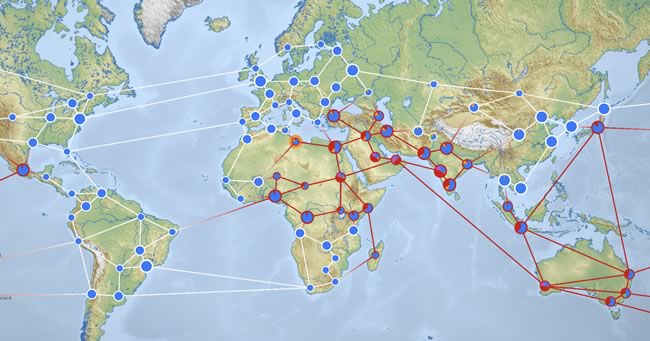« Automobili Lamborghini launches its first collector's digital stamp in collaboration with Bitstamps, dedicated to the Huracán EVO RWD Spyder. | Main | The Breitling Navitimer Automatic 35 — A Legendary Timepiece for the Cosmopolitan Woman. »
October 9, 2020
University of Oxford's Role-playing Computer Game helps Players understand How Vaccines Work on a Global Scale.


Photo: Oxford: High Street (Oxfordshire). Image credit: Michael Day.


Photo: A screenshot of the University of Oxford’s Vaccination Game. The computer game helps Players understand How Vaccines Work on a Global Scale. Image credit: Professor Hal Drakesmith.
Oxford, October 9, 2020 — A free game launched today allows players to role-play a virtual vaccine’s deployment to help to halt the global spread of a viral pandemic. The Vaccination Game, created by researchers at the University of Oxford’s MRC Weatherall Institute of Molecular Medicine, in collaboration with Goldsmiths, University of London, challenges players to figure out how they can deploy limited doses of the vaccine to best control a disease modeled on influenza.
Professor Hal Drakesmith and colleagues conceived the idea of developing a game. They are part of a research network focussing on immunizing babies and mothers to fight infections in low and middle-income countries. Following funding from, and in collaboration with, the IMPRINT research network, they were able to begin developing the game.
“We originally had the idea of the game and began developing it back in 2019, with influenza as our example disease,” said Professor Drakesmith. “Then COVID-19 struck, and the ideas behind the game are much more relevant.”
“Our game isn’t intended as a modeling or simulation tool, or meant to predict real-world scenarios,” Professor Drakesmith said. “Instead, we hope it’s educational, as it illustrates how vaccines can work on a global scale and shows that precisely how we deploy a vaccine across populations can be crucial to its effectiveness.”
Professor Drakesmith and his group collaborated with the Analysis, Visualisation, and Informatics group based in the University of Oxford’s MRC Weatherall Institute of Molecular Medicine to develop the game. They also worked with Goldsmiths, University of London, to produce the final version based on mathematical models of how a virus spreads and what effect a vaccine might have.
The virtual vaccine in the game is available in limited doses per week, and the player has to decide who to vaccinate in each of the 99 cities worldwide that are part of the game. Finally, the player receives a report on how well they played the game and how many lives were saved by the vaccine.
Steve Taylor, Group Leader of the Analysis, Visualisation and Informatics group, said, “You can replay the game multiple times to improve strategy and save more lives - it is possible to do very well!”
Professor Drakesmith concludes, “We hope players find The Vaccination Game interesting, useful, and fun to play.”
Source: The University of Oxford
|GlobalGiants.Com|
— The Chief Editor holds an Oxford Alumni Card and is a Member of the Oxford and Cambridge Society of India.







Edited & Posted by the Editor | 12:38 PM | Link to this Post







